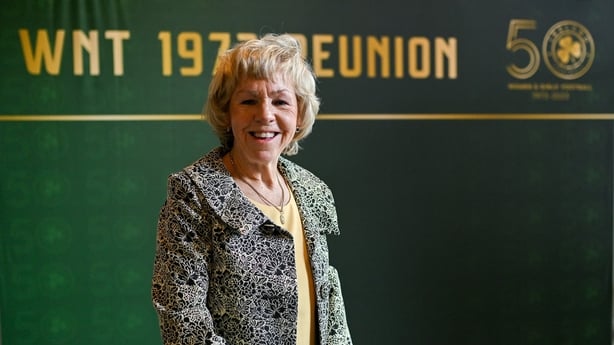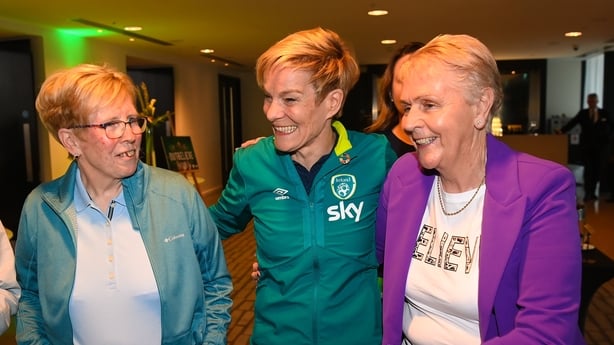The joy of reuniting with a long, lost friend has a special resonance and the buoyant sounds of belated catch-ups and warm embraces echoed around the lobby area at Dublin's Westin Hotel on Friday.
Those responsible for the animated atmosphere were a special group of players. The first women to represent the Republic of Ireland in an international fixture, brought together once again five decades on.
The date was 13 May 1973 when they lined out against Wales in Llanelli and in a happy coincidence, the 50th anniversary of that historic kickstart coincides with the year that an Irish team will kick off on a World Cup stage for the first time.
Former player Linda Gorman, who managed Ireland from 1991 to 1992, captured the mood as collective memories flooded back.
"Some of them I haven't seen in 50 years, so football is the mechanism by which we are all together here today," said the former Girls in Green captain who played internationally until 1985.
"I just can't wait. I haven't seen half of them, I just can't wait to see them, everything else is oblivious because it brings back so many memories - good and bad - of our youth and the things that we did and the friendships that we made and the fact that we were all on the same road, trying to better ourselves, play international football as best we could and yet we were all torn apart because of the geographical areas that we've lived in."
The depth of joy is probably only deepened by the fact that until the belated recognition of more recent times, the early pioneers of the women's national team were left with few mementos beyond the memories of what they had experienced first-hand.

"When people say to me, 'Do you have your Irish jersey? I said we were lucky to get them for the match," recalled Nora 'Nono' McHugh, Ireland's captain on the historic occasion against the Welsh.
"They were nearly taken off our backs as soon as the match was over. That's how bad it was. There was no money. I had to pay my way up on the train to go training. You didn’t do any training. It was all raw skill and talent."
The forthright Galwegian, who also made her mark in both camogie and Ladies football and remains as active as possible by cycling and running, added that: "I got one cap, I got the hall of fame thing in Galway for football. There was someone down from the FAI and someone said, 'Nono never got a cap'. It took me 40 years to get one cap. We weren't recognised.'"
Wales 2-3 Ireland, 13 May 1973
Goalkeeper: Anne Griffith
Defenders: Nora McHugh (captain), Geraldine Molloy, Sally Bownes, Mary O'Callaghan
Midfielders: Mary Gavin, Carol Carr, Linda Gorman, Margaret O'Connell, Catherine Rafferty
Forwards: Paula Gorham
Substitutes: Teresa Holland, Eleanor Carroll, Geraldine Grace
Selected but couldn't travel: Kathleen Ramsbottom, Ursula Grace
That first cap in Wales that Gorman and McHugh won together followed a more taxing journey than players of today would endure, with a ferry to Swansea and accomodation at local residents' homes in lieu of a team hotel.
And the match itself would prove a proverbial game of two halves. Paula Gorham, who had already made history by playing and scoring in a match on Welsh soil three years earlier for her hometown Dundalk against Manchester side Corinthians Nomads, netted the first goal of what would be a hat-trick.
'I just told them that they should be proud to wear the Irish jersey and what the hell they were doing on the pitch and get stuck in more'
But Wales fought back to take a 2-1 lead. However, a proper captain's half-time intervention from McHugh had the desired effect, seeing Ireland win 3-2 thanks to striker Gorham's second-half brace.
"I just told them that they should be proud to wear the Irish jersey and what the hell they were doing on the pitch and get stuck in more. They went out and played great," she said of how she got her team motoring again.
However, while they drew a good-sized crowd of around 3,000 onlookers to Llanelli's Stebonheath Park, the fixture itself didn't feel like a big deal at the time for 'Nono' given the backdrop of national anthems and pageantry were absent. Instead, a match in France at Paris' Parc des Princes four months later instead proved more memorable for the Irish captain.
"The biggest occasion I remember is the French game in France, because you had the television cameras there. I was in awe of that. It was a huge stadium, 7,500 at the match, and we played before the international between France and Italy," McHugh told RTÉ Sport.
"I thought I was dreaming. It was so unreal. When I look back now, at the time I just went with the flow. But that was the match I remember, the beautiful stadium and they were a professional team that we were playing. That's the match I remember more so than the Welsh game."

In between times, the team's first home game was held at Bluebell on 30 June with a 4-1 victory over Northern Ireland. Breda Hanlon was on the scoresheet that day although as she quipped, memories of how her goal went in would not be accurately relayed.
"I could say it was a swinger from the halfway line but I'd be lying," she said, although what was more crystal clear was the fact that concealing the fact that she was carrying an ankle injury meant she was able to play in that match in the first place.
Her commitment to the cause has not dimmed in 50 years, summed up by the fact that Hanlon cut short her holidays in Spain to rush home for the reunion.
"I wouldn't miss it for the world and it's brilliant to be recognised," she said.
"I know 50 years, people will say it's about time but to me it's now."
Part of the recognition for members of those early teams will come in the form of a one-off commemorative cap that will be presented later this year to every player that featured in an official game from 1973-2023.
Gorman has been the defacto record keeper and quasi-private investigator, instrumental in helping to prove that people whose contributions were lost to the sands of time in fact represented Ireland in the distant past.
"Sadly a couple of people have passed and I'm trying to get proof and I've had a couple of discussions with people who said, 'No, she didn't score' and I said, 'This girl, I played with her, (she was) called Tina Jones'. She passed in 2018. The first Irish player to score a hat-trick in Tolka Park, against Northern Ireland, and I've actually found the clip in the National Library of Ireland that raved about her playing in that match. So we're safely there," said Gorman of one of the examples of those whose international appearances she has been able to prove.
"I want to get historic records, very accurate, while we're all alive."
The commemorative caps are part of the thread that unites the pioneers of the early 1970s to the World Cup-bound golden generation of today and the latter have consistently acknowledged that they have been standing on the shoulders of giants.
For McHugh, she feels that her ultimate successor as captain, Katie McCabe, carries much of Ireland's hopes of success at the World Cup this summer.
But for the generation of 1973, success is being given due recognition while there is still a chance as the words 'Nono' imprinted within the Westin's lobby.
"It means so much. It means an awful lot now, because when I look back I suppose we did start it off. Before I go to the next world it is great to be recognised, that we played such an important part."
Listen to the RTÉ Soccer podcast on Apple Podcasts, Spotify or wherever you get your podcasts.

